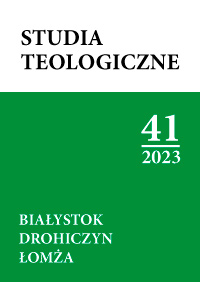Greckie drzwi Kościoła
Greek Church Door
Author(s): Zbigniew KrajewskiSubject(s): Christian Theology and Religion, Ancient World, Ancient Philosphy, Philosophy of Religion, History of Religion
Published by: Kuria Metropolitalna Białostocka
Keywords: Hellenists; Judeo-Christians; Greek philosophy; faith;
Summary/Abstract: The Apostle Paul does not engage in a critical dialogue with the doctrinal position of the particular schools of Greek philosophy, but with their version crafted for the needs of life (social, moral, spiritual). By necessity, he must sometimes touch upon more theoretical questions if he wants to convince the Greek listeners to his (sic. God’s) cause. So he tries to speak their language, which does not mean that everything that was said so far is accepted by him. The key to understanding the scope of Paul’s agreement with Greek philosophical expression may be, among others, the word “foolishness”. On the one hand (Greek) foolishness is the cross, and on the other hand (Paul’s) foolishness is philosophy. “Beware lest any man spoil you through philosophy and vain deceit, after the tradition of men, after the rudiments of the world, and not after Christ” (Col 2:8). The central issue for Christianity – the crucifixion of God-Man – is, in the Greek viewpoint, contrary to the rational order of things, i.e. something that cannot be of practical, let alone theoretical significance, although it is obvious that people today, as in the past, were guided by views far from rationality (especially philosophical). The reaction of the Athenian listeners to the words of St. Paul’s statement about the resurrection was natural and self-evident; they could not otherwise respond, as it was beyond their rationality and it was a kind of contradiction. Among others, the Apostle wanted to reach such people with the Good News. He could do it in the Greek way, for which of course he had no tools, and there was no time for that, but he could also act in an apostolic way: to sow this truth to the hearers and to wait for God’s growth. But first it was necessary to remove from the way the obstacles which directly contradicted the Gospel, and therefore he speaks of more than the foolishness of philosophy, as he calls it vile deception. There is no point in dealing with foolishness, but great fraud must be reckoned with and combated. So it is not the whole (Greek) philosophy that is foolish, but that part of it which cannot exceed the present rationality, which accepts delusion, but is blinded by the radiance of truth. Often, perhaps too often, a man resembles an eagle pretending to be a hen. The same rationality in later centuries, and especially in modern times, will take on different faces, although it will usually be a severe face to the face of faith.
Journal: Studia Teologiczne Białystok Drohiczyn Łomża
- Issue Year: 41/2023
- Issue No: 1
- Page Range: 51-81
- Page Count: 31
- Language: Polish

